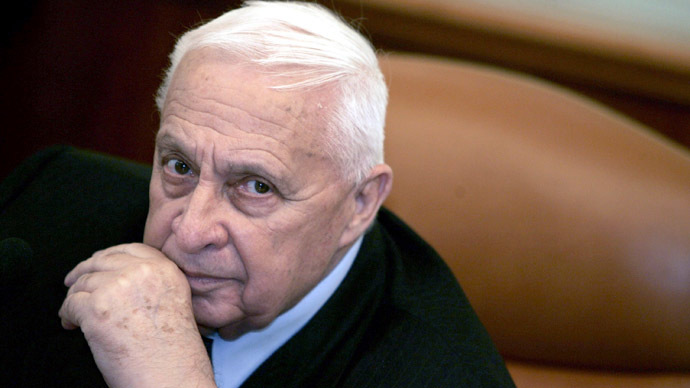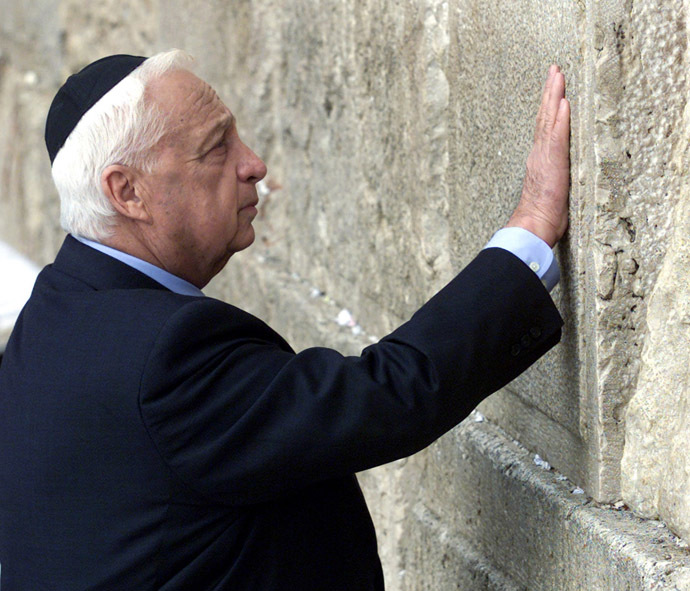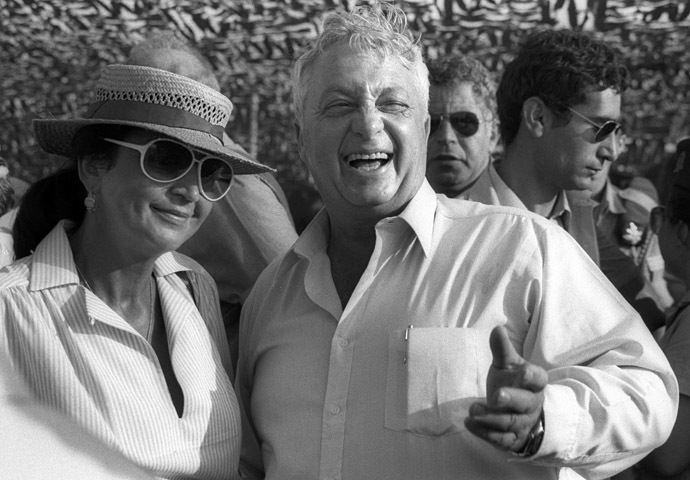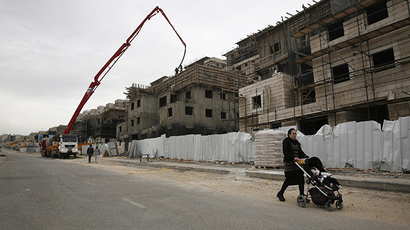Ex-Israeli PM Ariel Sharon dies at 85

The iconic but controversial former Israeli prime minister, Ariel Sharon, has died after his medical condition significantly deteriorated, his son confirmed to the media.
The 85-year-old politician died in Tel Aviv’s Tel Hashomer hospital, also known as the Chaim Sheba Medical Center, where he had been in a coma since January 2006 after suffering a stroke and brain hemorrhage.
Sharon will be buried at his family farm in the Negev desert on Monday next to his wife Lily, who died in 2000.
For nearly eight years he was on respiratory life support, occasionally opening his eyes and moving fingers. He was supported by fluids through a feeding tube.
Signs that his health was failing started coming shortly before the New Year, with a spokesman for the hospital reporting deterioration in Sharon’s medical condition. The ex-PM was suffering from “serious kidney problems” after undergoing surgery, army radio said.
News website Ynet quoted medical sources as saying Sharon was taken into intensive care a month ago.
"We are defining his condition as critical, and there is definitely a threat to his life," Zeev Rotstein, director of the Sheba Medical Center, told reporters. "The feeling of everyone ... is that this decline is very serious."
In September, Sharon underwent surgery to correct his intravenous feeding system.
Last January, neurological MRI scans revealed significant brain activity in the former PM’s brain. Medical staff recorded a positive response to family pictures, a recording of his son's voice and human touch.
Sharon, one of Israel’s most famous generals, was an iconic figure of his time, yet some of his policies remain controversial to this day.

As a military commander, Sharon sometimes disobeyed orders and followed bold and often risky tactics in battle. As a politician he was known as “the bulldozer,” a man capable of getting things done.
Rising from the rank of paratrooper to Defense Minister, Sharon played a prominent part in several of Israel’s armed conflicts – the 1948 War of Independence, the 1956 Suez War, the Six-Day War of 1967, the War of Attrition and the Yom-Kippur War of 1973 and the 1982 Lebanon War.
Sharon resigned as a Defense Minister in 1983 after a commission of inquiry found him personally liable for failing to prevent the massacre of Palestinian refugees in Beirut’s Sabra and Shatilla camps by Christian Phalangists.
After retiring from the army, Sharon joined and later led the Likud party, leaving it in 2005 to form the new Kadima party.
A military hawk, he was Israel’s prominent hard-liner when he was elected prime minister in 2001.
In mid-2005 he ended 38 years of military control of the Gaza Strip after directing a unilateral withdrawal of Israeli troops and settlers from the territory, a shock for those who supported Sharon’s championing of the construction of Israeli settlements in the West Bank and Gaza Strip.
World leaders send condolences to Israel, Palestinians celebrate
UN Secretary General Ban Ki-moon praised Sharon as “a hero to his people” for his determination, and urged Israel to build on his legacy of pragmatism to press ahead with the Israeli-Palestinian peace process, the organization’s press service reports.
“Prime Minister Sharon will be remembered for his political courage and determination to carry through with the painful and historic decision to withdraw Israeli settlers and troops from the Gaza Strip. His successor faces the difficult challenge of realizing the aspirations of peace between the Israeli and Palestinian people,” Ban said in a statement.

Russia’s President Vladimir Putin has also expressed condolences to Israel’s Prime Minister Benjamin Netanyahu on the death of an “outstanding statesman and military commander.” The late politician was highly respected by compatriots and was held in high esteem in the international arena, Putin said.
Russia will remember him as “a consistent supporter of Russian-Israeli friendly relations and as a person who made a considerable contribution to strengthening bilateral mutually advantageous cooperation,” the message reads.
US President Barack Obama praised Sharon’s commitment to Israel and reaffirmed America’s “unshakable commitment to Israel's security and our appreciation for the enduring friendship between our two countries.”
The United States continues to strive for lasting peace and security for Israel “including through our commitment to the goal of two states living side-by-side in peace and security,” he said, Reuters cites.
“Ariel Sharon ... has been a major figure in the history of his country. After a long military and political career, he made the choice to turn towards dialogue with Palestinians,” French President Francois Hollande said in a statement.
British Prime Minister David Cameron paid tribute to Sharon as “one of the most significant figures in Israeli history.”
“As prime minister he took brave and controversial decisions in pursuit of peace, before he was so tragically incapacitated. Israel has today lost an important leader,” Cameron said.
But as the world leaders express condolences, there is no remorse for the late Israeli prime minister among those who suffered from his controversial policies. Palestinians cheered and prayed for divine punishment of the former Israeli leader who masterminded military offensives against Palestinians in Lebanon, the West Bank and Gaza.
Meanwhile, Human Rights Watch (HRW) issued a statement on Saturday, stressing that Sharon “died without facing justice for his role in the massacres of hundreds and perhaps thousands of civilians by Lebanese militias in the Sabra and Shatilla refugee camps in Lebanon in 1982.”
“For the thousands of victims of abuses, Sharon’s passing without facing justice magnifies their tragedy,” said Sarah Leah Whitson, Middle East and North Africa director at Human Rights Watch.














